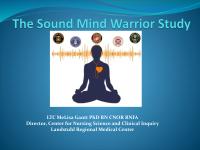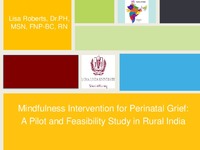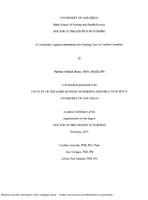| dc.contributor.author | Gantt, MeLisa A. | en |
| dc.date.accessioned | 2016-07-13T11:05:24Z | |
| dc.date.available | 2016-07-13T11:05:24Z | |
| dc.date.issued | 2016-07-13 | |
| dc.identifier | INRC16M05 | en |
| dc.identifier.uri | http://hdl.handle.net/10755/616141 | |
| dc.description | Theme: Leading Global Research: Advancing Practice, Advocacy, and Policy | en |
| dc.description.abstract | Session presented on Sunday, July 24, 2016: Purpose: Binaural Beat Technology (BBT), also known as Brain Entrainment Technology; is an auditory-neurophysiologic technique which uses auditory tones (often embedded in music, nature sounds or white noise) dichotically via stereo headphones to manipulate brainwave activity. Although this technology is widely marketed to the general public, only a hand full of studies have shown its efficacy. The Sound Mind Warrior Study was a double-blinded, randomized, repeated measure study that assessed the effect of BBT (in the theta brainwave frequency) on the cardiovascular (CV) stress response in a group of military service members with complaint of post-deployment stress. Methods: A sample of 74 United States military service members (age 22-61), with complaint of post-deployment stress, was randomly placed into two groups (music with BBT and music without BBT). Each group was exposed to their respective intervention for a minimum of 30 minutes at bedtime, three times a week, for a total of four weeks. Participants underwent pre and post 20-minute CV stress tests using the Biocom Technologies heart rate variability (HRV) monitor to assess the effect of the technology. Results: Using a 2x2 mixed Analysis of Variance, a statistical significant difference (F(1, 63) = 7.56, p = .008 (?2 = .107) was found in the low frequency HRV measures, whereas the Music with BBT group showed a decrease while the Music Only group showed an increase (Pre = 77.83, Post = 75.33 vs Pre = 66.42, Post = 74.41). A statistical significant difference was also found in the high frequency HRV measures (F(1, 63) = 7.56, p = .008 (?2 = .107) whereas the Music with BBT group showed an increase while the Music Only group showed a decrease (Pre = 22.17, Post = 24.67 vs Pre = 33.58, Post = 25.94). Finally, the Music Only group showed a significant decrease (F(1, 57) = 4.39, p = .041 (?2 = .072) in Total Power HRV measures when compared to the Music with BBT group (Pre = 2098.90; Post = 985.26 vs Pre = 1249.75; Post = 1223.07). Conclusion: When placed under an acute stressor after using music embedded with BBT, participants showed a decrease in sympathetic response and an increased in parasympathetic response. Those who used music alone had the opposite effect. In other words, those who did not use the technology exhibited more cardiovascular signs of chronic stress exposure. Significance to Nursing: BBT does not require a doctor's order nor does it need to be administered by an advance practice provider. It can be an independent nurse initiated action at the bedside or in an outpatient setting. However, given that it is freely available to the general public and not regulated, warrants more research and scrutiny. | en |
| dc.format | Text-based Document | en |
| dc.language.iso | en | en |
| dc.subject | Cardiovascular Stress Response | en |
| dc.subject | Binaural Beat Technology | en |
| dc.subject | Military | en |
| dc.title | The Sound Mind Warrior Study: Using sound technology to combat stress in military service members | en |
| dc.title.alternative | Working With Our Military | en |
| dc.rights.holder | <p>
All rights reserved by the author(s) and/or publisher(s) listed in this item record unless relinquished in whole or part by a rights notation or a Creative Commons License present in this item record.
</p><p>
All permission requests should be directed accordingly and not to the Sigma Repository.
</p><p>
All submitting authors or publishers have affirmed that when using material in their work where they do not own copyright, they have obtained permission of the copyright holder prior to submission and the rights holder has been acknowledged as necessary.
</p> | |
| dc.description.note | Items submitted to a conference/event were evaluated/peer-reviewed at the time of abstract submission to the event. No other peer-review was provided prior to submission to the Henderson Repository. | en |
| dc.type.category | Full-text | en |
| dc.contributor.department | Theta Epsilon | en |
| dc.author.details | LTC MeLisa Gantt, RN, CNOR, RNFA | en |
| dc.conference.name | 27th international Nursing Research Congress | en |
| dc.conference.host | Sigma Theta Tau international, the Honor Society of Nursing | en |
| dc.conference.location | Cape Town, South Africa | en |
| dc.date.conferenceyear | 2016 | |
| dc.description.reviewtype | Abstract Review Only: Reviewed by Event Host | en |
| dc.description.acquisition | Proxy-submission | en |





